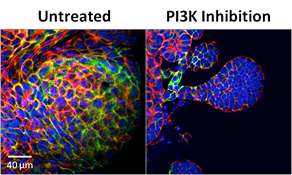Breakthrough in fibrosis research

Researchers from the Departments of Pharmacy & Pharmacology and Biology & Biochemistry have made an important discovery that might lead to novel therapies to combat chronic fibrotic diseases.
Remarkably, this breakthrough arose by studying the developmental pathways that orchestrate embryonic growth of an organ including lung development.
The work (funded jointly by the Medical Research Council and Novartis) is published in PLOS One this week.
The research team, led by Professors Steve Ward and David Tosh, focused on the role of a molecule called PI3K in the formation of the airways during embryonic lung development.
Using experimental models where the branching of the airways could be observed in real time the team report that PI3K plays a key negative role in airway branching. This has been demonstrated by a robust increase in airway branching following inhibition of PI3K with experimental drugs.
Interestingly, the reported effects of PI3K in the lung were contradictory to those previously reported in other branching organs such as salivary glands and pancreas, which reveals an important difference in the development of these organs.
"Importantly, these molecular pathways can show a resurgence in disease settings in later life and lead to remodelling of an organ to a degree where function becomes impaired," said Professor Ward.
Professor Ward added: "PI3K exists in several distinct forms that often have different biological roles. We used experimental drugs that can discriminate between these various forms of PI3K, and identified that the alpha form is the key driver in regulating airway branching.
"New drugs targeting PI3K are under development as anti-cancer agents and have shown immense promise. Our work is an exciting development as drugs being developed against PI3Kalpha as anti-cancer agents, may also have added value as anti-fibrotic agents in the future."
Lead author Dr Ed Carter, who worked for four years on the project, said: "Insight into the molecular signals driving embryonic organ development will aid in the understanding of how these signals become reactivated and remodel an organ during fibrotic disease. Hopefully, this will lead to novel regenerative therapies to treat fibrotic disease including lung fibrosis."

















